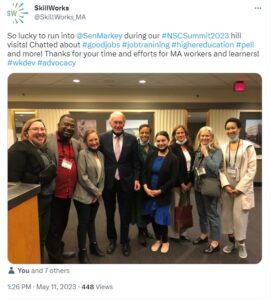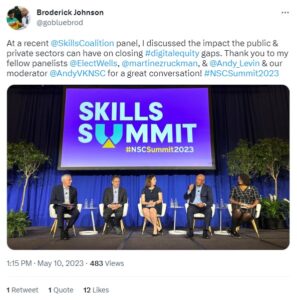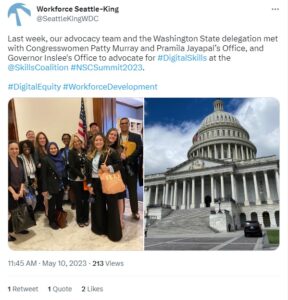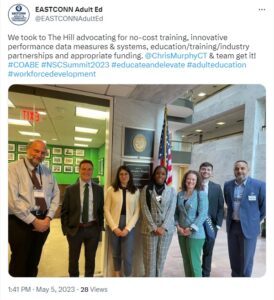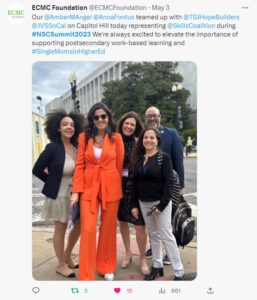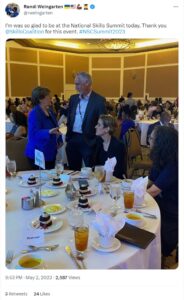It really takes everyone to advance equity and to break down the systemic barriers that prevent too many Americans from accessing high-quality, inclusive skills training that leads to good jobs and careers. That’s NSC’s theory of change – and if you looked around the ballroom at the 2023 Skills Summit, our theory of change was in motion. As Rachel Unruh, NSC’s Chief of External Affairs pointed out in her welcoming remarks, Everyone is exactly who showed up to do this important work – community college administrators and instructors, business leaders, community-based organization leaders, and labor leaders. There were people from the workforce system, the higher education system, the adult education system, the career and technical education system, the public aid system, and the criminal justice system. There were advocates for racial and gender justice, for immigrant justice, for environmental justice, for people who are unhoused, people with disabilities, advocates for youth and for seniors. There were republicans, democrats, and independents.
More than 430 people from 36 states came together at the Skills Summit to talk about the current opportunities in Washington to scale and sustain best practices through public policy. Thanks to their on-the-ground expertise, they know the difference between a best practice that helps 20 people build digital resilience in the face of constantly changing workplace technologies – and a sustained, scaled best practice that helps 200,000 people – is public policy. We know the difference between an industry partnership that grows a racially and gender inclusive infrastructure workforce in one community – and industry partnerships driving that change in 1,000 communities – is public policy. And we know that dismantling structural inequality and growing a truly inclusive workforce requires a lot of levers and one of those levers is public policy.
After two days of content-packed plenaries and dynamic concurrent sessions, attendees joined others from their states to meet with their Senators and Representatives on Capitol Hill to advocate for skills training policy. In total, the Skills Summit generated more than 150 hill visits in addition to five meetings with Biden Administration officials from the U.S. Departments of Labor, Commerce, Education, and Agriculture.
Click here for comprehensive information & content from the 2023 Summit.
“The Skills Summit helped us keep a finger on the pulse of federal workforce policies while ensuring our congressional delegation hears examples of how these policies impact real, everyday Tennesseans. We walked away with a deeper understanding of how our statewide coalition can be a partner with policymakers in ensuring workforce policies expand individual economic mobility while meeting our state’s workforce needs.”
– Stephanie Coleman, Chief Talent Development Officer, Nashville Area Chamber of Commerce
and Co-Lead for the TN Business Leaders United (BLU)-SkillSPAN Coalition
“The summit was very helpful in preparing us for our trip to Capitol Hill, where we made our presentations to the Louisiana Congressional delegation. Hopefully, our collective messages resonated, and legislation that will help the citizens of Louisiana gain employment in high-skill, high-wage, in-demand occupations will be enacted into law.”
– Kathy Weaver, Director, Carl Perkins & Hilton Career Pathways,
Delgado Community College
The opening plenary, Realizing the Promise of Infrastructure Jobs, took a hard look at where we are more than a year after the passage of major infrastructure investments. The panelists- Broderick Johnson, Executive Vice President, Public Policy & Executive Vice President Digital Equity at Comcast; Representative Andy Levin, Distinguished Senior Fellow at Center for American Progress; Stephanie Martinez-Ruckman, Legislative Director for Human Development at the National League of Cities, and Melissa Wells, Special Assistant to the President at North America’s Building Trade Unions assessed whether we’re truly on the way to meeting the equity imperative for these investments laid out by the Biden administration. The plenary also included a look back at conversations NSC’s CEO Andy Van Kleunen had with cabinet secretaries and White House leadership about this imperative over the last year and a look forward with leaders from the stakeholder groups that are essential partners in building an inclusive infrastructure workforce – business, labor, nonprofit, and public sectors.
Click here for more about NSC’s People-Powered Infrastructure Campaign.
Nicole Barcliff, Senior Policy Director at Local Initiatives Support Corporation (LISC), Allison Dembeck. Vice President of Education and Labor Advocacy at the U.S. Chamber of Commerce, Eric Rodriguez, Senior Vice President, Policy and Advocacy at Unidos US all work in Government Affairs roles in their respective organizations and are in routine conversation with members of Congress and their staff on Capitol Hill. They shared their insider knowledge of the advocacy environment in Washington during the View from Inside the Beltway: Advocating for Inclusive Skills Training plenary. The discussion shared the realities of Congress’ capacity to advance policies this year, the impact of new leadership in the House on setting a Congressional agenda, and whether bipartisanship is even possible in the year before a Presidential election. Attendees also heard remarks from several members of Congress who championed skills training as a bipartisan issue and drove home the importance of our shared advocacy.
“Attending the Skill Summit is a must. Whether you are a government agency, nonprofit service provider, or advocate, you walk away with substantive knowledge of the current landscape of the various intersections and coordinated efforts that is the ecosystem of workforce development. You gain tools to work and grow and serve your clients and community to make an impact. And you “take it to the Hill,” where you get to use your voice to share critical needs and concerns with our lawmakers. I was so pleased with every aspect of this conference – from the speakers, to the staff, to the access to a network of stellar people – all to improve workforce development.”
– Guadalupe A. Velasquez, Managing Director,
Welcoming City / US Together Inc.
A plenary moderated by Paul Fain, journalist at The Job (a newsletter about connections between education and the American workforce) aimed to highlight what states have done to make quality postsecondary credentials affordable and how to advocate for similar changes at the federal level. The panel featured Indivar Dutta-Gupta, President & Executive Director at the Center for Law and Social Policy; Dr. Anne Kress, President of Northern Virginia Community College; Jennifer Stiddard, Senior Fellow at National Skills Coalition and Dr. Jermaine F. Williams, President of Montgomery College. Panelists uplifted adult learners, situating them at the forefront of discussions on how to improve our postsecondary education and training policy.
Click here for more information about NSC’s Making College Work Campaign.
Randi Weingarten, President of the American Federation of Teachers joined the mainstage plenary to talk about her perspective on the fight for Good Jobs and why public investments in education and training matter for working people and students. The conversation with NSC Chief Strategy Officer, Brooke DeRenzis focused on Career and Technical Education. Weingarten spoke about the takeaways she took with her from her time teaching that are still true today: partnerships are key, people need access to training, and those costs should not fall to students alone.
Weingarten kicked off the plenary entitled Skills Training in the Fight for Good Jobs and an Inclusive Economy. She was followed by a panel that brought together people from the workforce development field with people who work in the economic and racial justice space: Tameshia Bridges Mansfield, Vice President, Workforce and Regional Economies at Jobs for the Future; Angela Hanks, Chief of Programs, at Demos; and Abby Snay, Deputy Secretary for the Future of Work at the California Labor and Workforce Development Agency.
Angela Hanks issued a call-to-action – imploring skills training organizations, worker rights organizations, unions, and community organizations to partner to make the most of implementation saying, “These organizations need each other. There’s money for workforce development, but there’s no guarantee that the jobs created with this funding will be good jobs. That is a task for everyone in this room – and the way that we do that is through partnerships.” She urged advocates to hold public officials accountable for how they disperse funds and to work to ensure that jobs created are good jobs – and that communities of color, women, and others can benefit from investments. “This does not feel optional,” she said.
“This is a huge opportunity to make this unprecedented level of investment actually move the needle for communities of color and for people who have been historically marginalized. We must come together.”
“Attending the Skills Summit 2023 for the first time was a unique opportunity to engage with other professionals in the field and to learn about the latest bills and innovations in workforce development. I was particularly impressed by the diversity of perspectives and experiences represented at the Summit and the depth of knowledge and expertise of the speakers (especially Jennifer Stiddard of NSC). I left the Summit with a renewed sense of energy and purpose in my work. I feel empowered by the experience of advocating at the Capitol. The experience of advocating for this issue has not only deepened my understanding of the challenges we face to truly help our nation thrive but also strengthened my commitment to working toward solutions that promote workforce development and social equity.”
– Chuchay Stark, Coordinator,
Saratoga County Department of Workforce Development
The Summit Featured video stories from two working students. Khaija Faulk from New Orleans, Louisiana who graduated from the New Orleans Career Center trained for a credential that led to a job as a healthcare support instructor – a job that allows her support herself while she goes to nursing school. Attendees also heard from Miguel Hernandez from Fresno, California who by attending coding classes at Bitwise Industries, earned a certificate that helped him land a job doing email marketing.
Click here to hear the video greetings from Congresswoman Suzanne Bonamici (D-OR), Senator Mike Braun (R-IN), Congresswoman Lisa Blunt-Rochester (D-DE) and Senator Tammy Baldwin.
“When I began my journey in digital equity, I did not immediately realize the complexity of the digital divide. I thought my job was to connect people with devices and affordable broadband. I remember being pointed to NSC, and meeting Amanda Bergson-Shilcock and seeing what an amazing resource was available for me. My Goodwill colleagues and I were immersed in the national work of the importance of digital skills and heard from other leaders and connected with practitioners as we all are stewards of our generations new “New Deal.” I feel energized to bring back the knowledge to continue to bridge the digital divide in Washington State.”
– Nancy Chang, Director of Digital Navigation Services,
Goodwill of the Olympics and Ranier Region
On the third day of the Summit, as most attendees were paying advocacy visits to their Senators and Representatives, NSC hosted a Digital Skills at Work legislative briefing on Capitol Hill to highlight for Congressional staff, workforce advocates, and members of the press the importance of creating opportunities for workers to advance their digital skills on the job, and when they lose their job.
The briefing featured remarks from Senator Tim Kaine (D-VA), who previewed new legislation he is working on in partnership with NSC that would amend the Workforce Innovation and Opportunity Act to provide key digital skills training opportunities for workers and students.
Robert Guzman, Chief of External Affairs of ScaleLit (formerly Chicago Citywide Literacy Coalition); Constance Green, State Coordinator for WIOA Adult & Dislocated Worker Programs at Virginia’s Community Colleges System; and Marisol Tapia Hopper, Director of Strategic Partnerships & Funding, Workforce Development Council of Seattle-King County (and WA SkillSPAN lead) provided remarks via a panel moderated by NSC Government Affairs staff member Caroline Treschitta, for why the communities they serve need access to digital skills training to improve local and state economies, and get workers into good career paths.
Bishara Addison, Director of Job Preparation at the Fund for Our Economic Future, was named as the 2023 recipient of the Dr. Alma Salazar Bridge Builder Award. The award is given to a member of NSC’s network who exemplifies Dr. Salazar’s commitment to bringing together uncommon allies in support of inclusive skills policy.
During 2022, Bishara exemplified the spirit of the Dr. Alma Salazar award, by bringing together a diverse group of partners, including economic developers, employers, education and training providers, and researchers to drive forward an equitable workforce.
“Dr. Alma Salazar demonstrated the value of relationships in driving systems change,” Addison said. “What an incredible honor it is to receive an award from an organization that brings together the brightest minds and fiercest advocates across sectors to ensue policies at the federal and state level that promote pathways for economic and social mobility for all. Dr. Alma Salazar was known for being a warrior for those that don’t always have a voice, a collaborator, an ecosystem translator, and as the name of this award states – a bridge builder. As I continue in my career as an advocate for systems change — so that individual outcomes are no longer determined by race or place — I hope that I’m held accountable for embodying the beautiful spirit of Dr. Alma Salazar and inspire others to continue her work.”
“As individual leaders, we may have an impact regionally, yet as NSC members advocating for workforce skills training and education, we can collaborate on a larger scale to inform and influence the decisions made in Washington. NSC provides the space for us to learn from each other about best practices and advocacy strategies supporting workforce skill training driving economic prosperity for workers and businesses.”
– Noemí Custodia-Lora, Ph.D. Vice President of Lawrence Campus & Community Relations,
Northern Essex Community College
Check out photos of the event on our Flickr Page.
Some of our favorite tweets from the event are below – you can follow the rest of the conversation on twitter here #NSCSummit2023.
